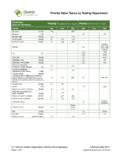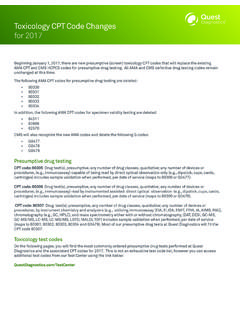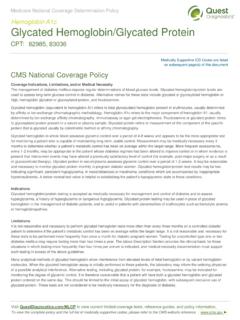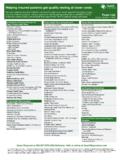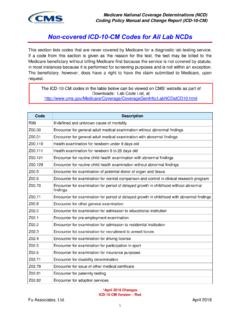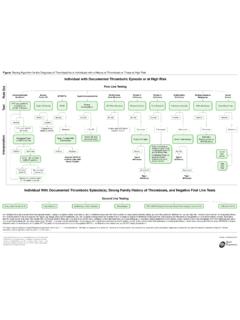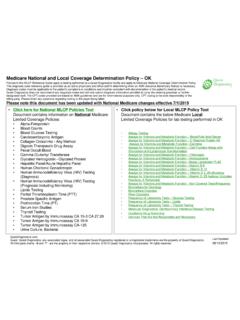Transcription of Medicare National Coverage Determination Policy
1 Medicare National Coverage Determination Policy Policies in this MLCP Reference Guide apply to testing performed at a Quest Diagnostics facility and apply to Medicare National Coverage Determination Policy . This diagnosis code reference guide is provided as an aid to physicians and office staff in determining when an ABN (Advance Beneficiary Notice) is necessary. Diagnosis codes must be applicable to the patient's symptoms or conditions and must be consistent with documentation in the patient's medical record. Quest Diagnostics does not recommend any diagnosis codes and will only submit diagnosis information provided to us by the ordering physician or his/her designated staff. The CPT codes provided are based on AMA guidelines and are for informational purposes only. CPT coding is the sole responsibility of the billing party. Please direct any questions regarding coding to the payer being billed.
2 Please note this document has been updated with National Medicare changes effective 7/1/2015. Alpha-Fetoprotein Blood Counts Blood Glucose Testing Carcinoembryonic Antigen Collagen Crosslinks - Any Method Digoxin Therapeutic Drug Assay Fecal Occult Blood Gamma Glutamyl Transferase Glycated Hemoglobin - Glycated Protein Hepatitis Panel/Acute Hepatitis Panel Human Chorionic Gonadotropin Human Immunodeficiency Virus (HIV) Testing (Diagnosis). Human Immunodeficiency Virus (HIV) Testing (Prognosis Including Monitoring). Lipids Testing Partial Thromboplastin Time (PTT). Prostate Specific Antigen Prothrombin Time (PT). Serum Iron Studies Thyroid Testing Tumor Antigen by Immunoassay CA 15-3 CA Tumor Antigen by Immunoassay CA 19-9. Tumor Antigen by Immunoassay CA-125. Urine Culture, Bacterial Quest, Quest Diagnostics, any associated logos, and all associated Quest Diagnostics registered or unregistered trademarks are the property of Quest Diagnostics.
3 Last Updated: All third party marks - and - are the property of their respective owners. 2015 Quest Diagnostics Incorporated. All rights reserved 7/1/2015. Medicare National Coverage Determination Policy Alpha-Fetoprotein Data Source: CPT Code: 82105. NCD Description:. Alpha-fetoprotein (AFP) is a polysaccharide found in some carcinomas. It is effective as a biochemical marker for monitoring the response of certain malignancies to therapy. ICD-9-CM Codes that Support Medical Necessity The Alpha-fetoprotein (AFP) is determined to be medically necessary by Medicare only when it is ordered for patients with one of the conditions listed below. ICD-9-CM. codes that support medical necessity are listed, but it is not enough to link the procedure code to a correct payable ICD-9-CM code. The diagnosis must be present for the procedure to be paid and the procedure must be reasonable and medically necessary for that diagnosis.
4 Documentation within the patient's medical record must support the medical necessity for the test(s) provided. Chronic viral hepatitis B with hepatic coma, with or without Other hemochromatosis mention of hepatitis delta Other disorders of iron metabolism Chronic viral hepatitis B without mention of hepatic coma, Disorder of copper metabolism with or without mention of hepatitis delta Cystic Fibrosis without mention of meconium ileus Chronic hepatitis C with hepatic coma Cystic fibrosis with gastrointestinal manifestations Chronic hepatitis C without mention of hepatic coma Other deficiencies of circulating enzymes Syphilis of liver Sideroblastic Anemia Clonorchiasis Neoplasm related pain (acute) (chronic). Fascioliasis Coronary atherosclerosis due to calcified coronary lesion Malignant neoplasm of the liver and intrahepatic bile ducts Saddle embolus of abdominal aorta Malignant neoplasm of the mediastinum Other arterial embolism and thrombosis of abdominal aorta Malignant neoplasm, ovary Alcoholic cirrhosis of liver Malignant neoplasm of undescended testis Chronic hepatitis, unspecified Malignant neoplasm, other and unspecific testis Chronic persistent hepatitis Secondary malignant neoplasm of mediastinum Autoimmune hepatitis Secondary malignant neoplasm of liver Other chronic hepatitis Secondary malignant neoplasm of ovary Cirrhosis of liver without mention of alcohol Secondary malignant neoplasm, genital organs Hepatopulmonary syndrome.
5 Malignant carcinoid tumors of other and Other specified disorders of male genital organs unspecified sites Solitary pulmonary nodule Secondary neuroendocrine tumor, unspecified site Other nonspecific abnormal finding of lung field Secondary neuroendocrine tumor of distant lymph nodes Non-specific (abnormal) findings on radiological and other Secondary neuroendocrine tumor of liver examination of other intrathoracic organs Secondary neuroendocrine tumor of bone Non-specific (abnormal) findings on radiological and other Secondary neuroendocrine tumor of peritoneum examination of biliary tract Secondary Merkel cell carcinoma Non-specific (abnormal) findings on radiological and other Secondary neuroendocrine tumor of other sites examination of abdominal area, including retroperitoneum Benign neoplasm of liver and biliary passages Other abnormal tumor markers Neoplasm of uncertain behavior of liver and biliary passages Personal history of malignant neoplasm, liver Mixed hyperlipidemia Personal history of malignant neoplasm, ovary Alpha-1-antitrypsin deficiency Personal history of malignant neoplasm, testis Hereditary hemochromatosis Estrogen receptor positive status [ER+].
6 Hemochromatosis due to repeated red blood cell transfusions Estrogen receptor negative status [ER-]. This list was compiled from Medicare 's Limited Coverage Policies for informational and reference purposes only. For the most current information please reference Note: If the patient's medical record does not support one of the above ICD-9-CM codes, please prepare an Advance Beneficiary Notice form, and ask the patient to read and sign it. Source: Federal Registry Negotiated Rule-making, November 23, 2001. The cpt codes provided are based on ama guidelines and are for informational purposes only. Cpt coding is the sole responsibility of the billing party. Please direct any questions regarding coding to the payer being billed. Last Updated: Quest, Quest Diagnostics, any associated logos, and all associated Quest Diagnostics registered or unregistered trademarks are the property of Quest Diagnostics.
7 7/1/2015. All third party marks - and - are the property of their respective owners. 2015 Quest Diagnostics Incorporated. All rights reserved Medicare National Coverage Determination Policy Blood Counts (1 of 5) Data Source: CPT Codes: 85004, 85007, 85008, 85013, 85014, 85018, 85025, 85027, 85032, 85048, 85049. NCD Description: Blood counts are used to evaluate and diagnose diseases relating to abnormalities of the blood or bone marrow. These include primary disorders such as anemia, leukemia, polycythemia, thrombocytosis and thrombocytopenia. Many other conditions secondarily affect the blood or bone marrow, including reaction to inflammation and infections, coagulopathies, neoplasms and exposure to toxic substances. Many treatments and therapies affect the blood or bone marrow, and blood counts may be used to monitor treatment effects. ICD-9-CM Codes that Support Medical Necessity are not provided ICD-9-CM codes that do not support medical necessity are listed, but it is not enough to link the procedure code to a correct payable ICD-9-CM code.
8 The diagnosis must be present for the procedure to be paid and the procedure must be reasonable and medically necessary for that diagnosis. Documentation within the patient's medical record must support the medical necessity for the test(s) provided. ICD-9-CM Codes That Do Not Support Medical Necessity Chorioretinal scars Viral warts Choroidal degeneration Benign neoplasm of lip, oral cavity, and pharynx Hereditary choroidal dystrophies Lipoma, skin and subcutaneous tissue of face Choroidal detachment Benign neoplasm of skin Cataract 217 Benign neoplasm of breast Disorders of refraction and accommodation Benign neoplasm of male genital organs Corneal opacity and other disorders of cornea Benign neoplasm of eyeball, except conjunctiva, cornea, retina, and choroid Inflammation of eyelids Carcinoma in situ of lip, oral cavity and pharynx Disorders of lacrimal system Carcinoma in situ of skin *Endocrine exophthalmos Neurotic disorders *Deformity of orbit Personality disorders *Enophthalmos Sexual and gender identity disorders *Retained (old)
9 Foreign body following penetrating wound of orbit Stuttering *Orbital cysts; myopathy of extraocular muscles Tics *Other orbital disorders Stereotypic movement disorder *Unspecified disorder of orbit Pain disorders related to psychological factors Optic atrophy Disturbance of conduct, not elsewhere classified Other disorders of optic disc Disturbance of emotions specific to childhood and adolescence Perforation of tympanic membrane Hyperkinetic syndrome of childhood Other specified disorders of tympanic membrane Central pain syndrome Other disorders of middle ear and mastoid Acute pain due to trauma Otosclerosis Acute post-thoracotomy pain Degenerative and vascular disorders of ear; noise effects on inner ear;. Other acute postoperative pain sudden hearing loss, unspecified; and tinnitus Other acute pain Other abnormal auditory perception Chronic pain due to trauma Disorders of acoustic nerve Chronic post-thoracotomy pain , Conductive hearing loss Other chronic postoperative pain Sensorineural hearing loss Other chronic pain Mixed hearing loss Chronic pain syndrome Deaf, non-speaking, not elsewhere classifiable , Hearing loss Atherosclerosis of aorta and renal artery This list was compiled from Medicare 's Limited Coverage Policies for informational and reference purposes only.
10 For the most current information please reference Source: Federal Registry Negotiated Rule-making, November 23, 2001. The cpt codes provided are based on ama guidelines and are for informational purposes only. Cpt coding is the sole responsibility of the billing party. Please direct any questions regarding coding to the payer being billed. Last Updated: Quest, Quest Diagnostics, any associated logos, and all associated Quest Diagnostics registered or unregistered trademarks are the property of Quest Diagnostics. 7/1/2015. All third party marks - and - are the property of their respective owners. 2015 Quest Diagnostics Incorporated. All rights reserved Medicare National Coverage Determination Policy Data Source: Blood Counts (2 of 5). CPT Codes: 85004, 85007, 85008, 85013, 85014, 85018, 85025, 85027, 85032, 85048, 85049. NCD Description: Blood counts are used to evaluate and diagnose diseases relating to abnormalities of the blood or bone marrow.
